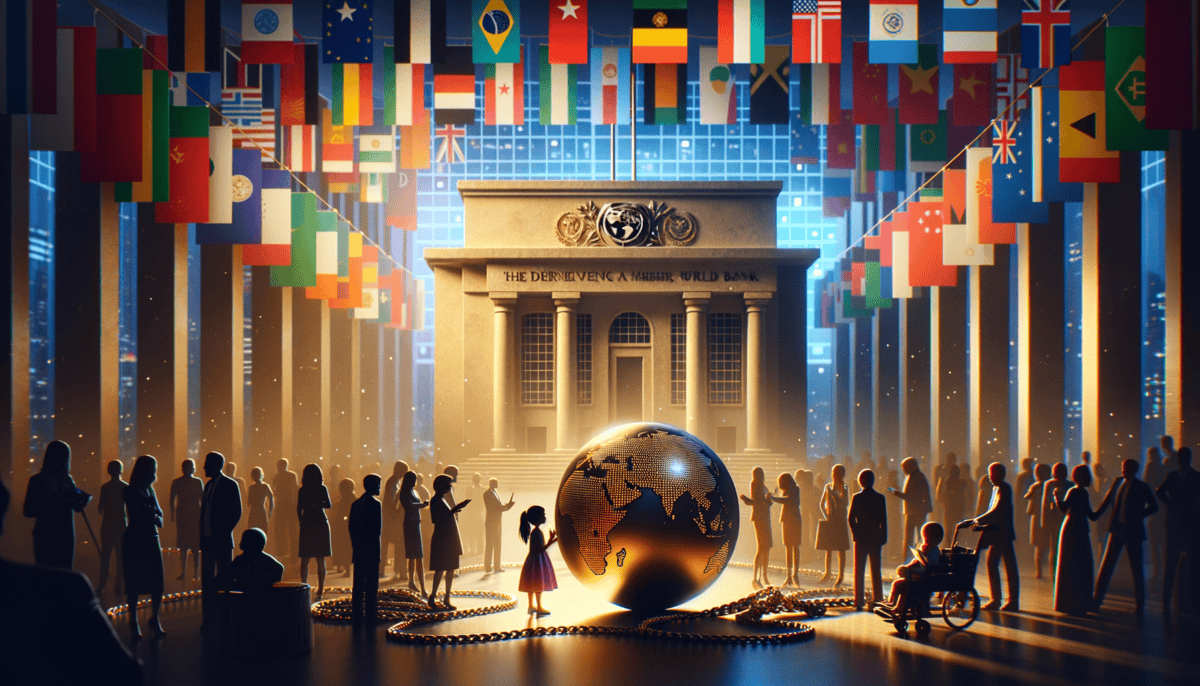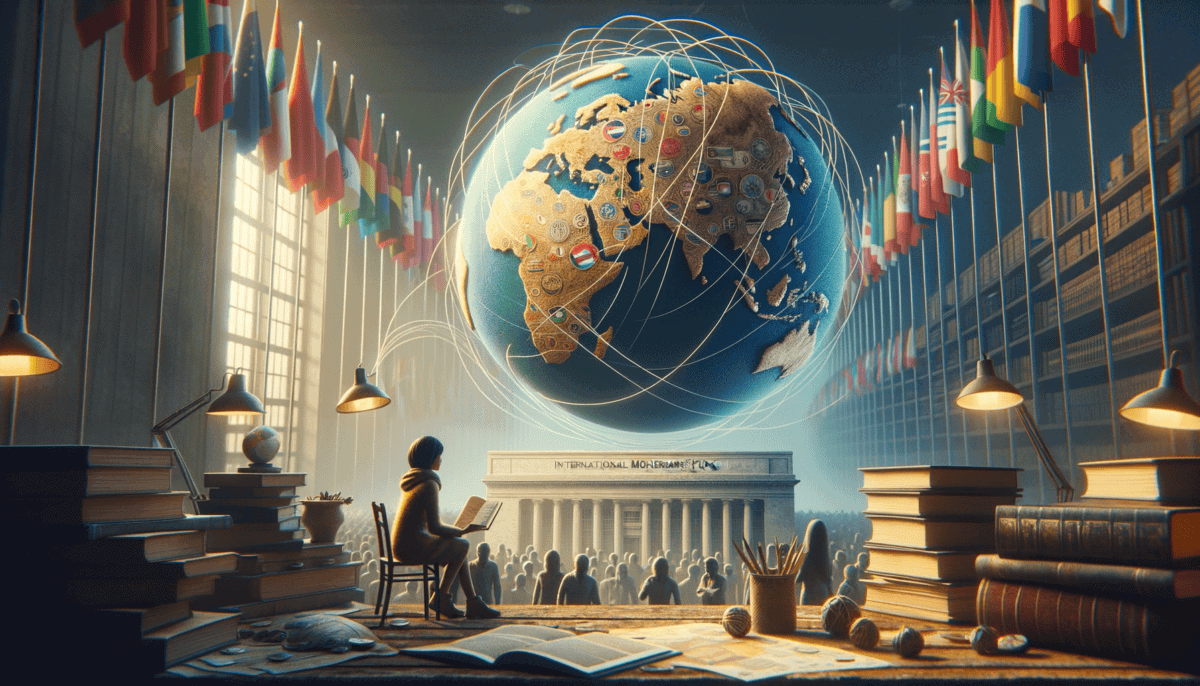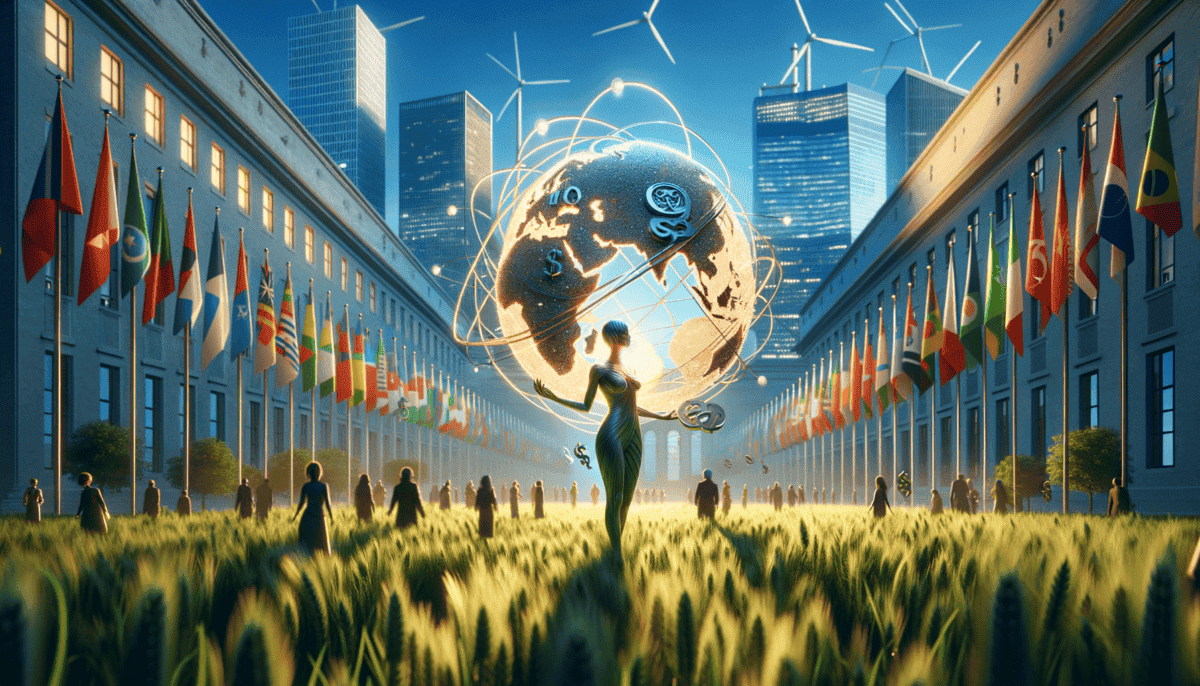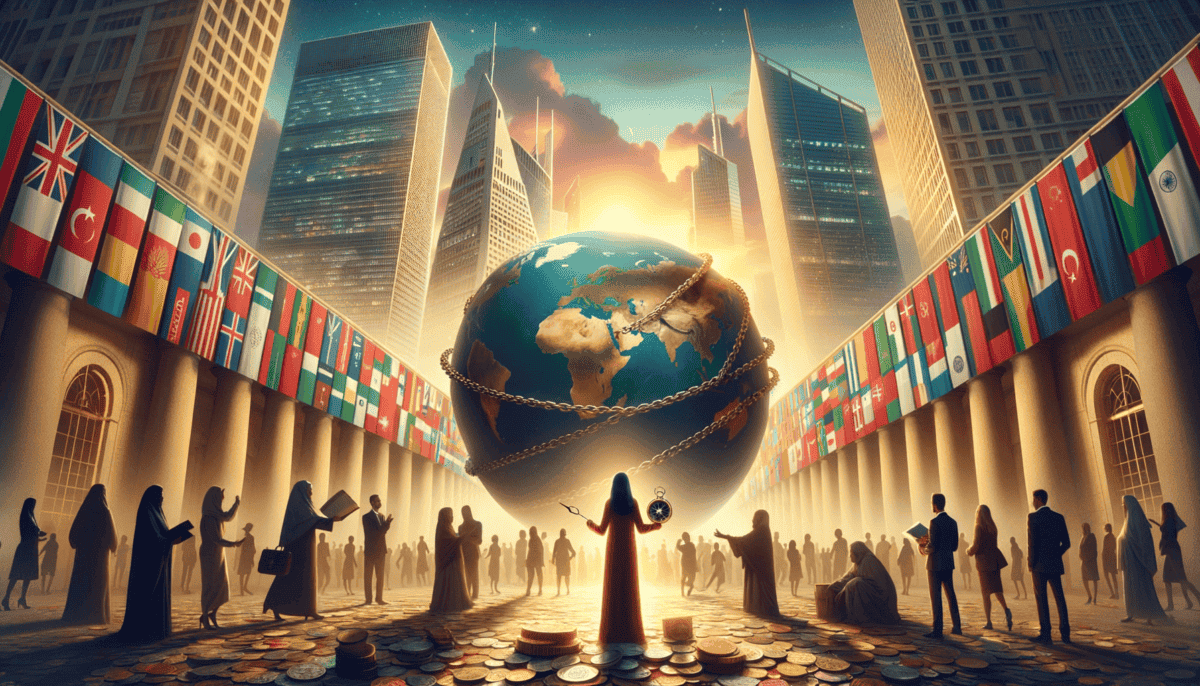Seeds of Recovery
The warm African sun peeked through Amina's window as she listened to her grandfather's stories. It was 1945, and the world was changing fast.
"Little one," Grandfather said, his eyes twinkling, "let me tell you about the day the world tried to fix itself."
Amina snuggled closer on their worn couch. At eight years old, she loved hearing about the big world beyond their small village in Ghana.
“After the big war ended, many countries were broken. Buildings were down. People were sad. But something amazing happened – countries decided to work together!” Grandfather explained.
He pulled out an old newspaper. The headline read: "New Banks to Help Fix the World!"
"Two special banks were born," he continued. "The IMF and World Bank. Think of them like piggy banks for the whole world!"
Amina's eyes grew wide. "A bank for the whole world? That's so big!"
A New Beginning
Grandfather smiled and drew two simple pictures:
- A building with "IMF" on top, helping countries with money problems
- Another with "World Bank" written, helping build schools and roads
"But why do we need these banks?" Amina asked, tracing the drawings with her finger.
"You see, sweet one, after the war, many places needed help. Just like when our neighbor James needed tools to fix his roof, countries needed money to fix their roads and schools."
Hope Grows Like Seeds
Amina's mother, Sarah, joined them, bringing sweet tea. She worked at a local bank and understood money well.
"The best part," Sarah added, "is that these banks helped countries work together. Like when we all help plant crops during harvest season!"
Amina thought about the community garden where everyone shared tools and seeds. "So countries share too?"
"Yes!" both adults said together, laughing.
Dreams of Tomorrow
That night, Amina couldn't sleep. She imagined a big table where all countries sat together, sharing and helping each other. In her dream, everyone had enough food, good schools, and safe homes.
She didn't know it then, but this was just the beginning of her journey with money and helping others. Her grandfather's stories about the IMF and World Bank had planted a seed – a seed that would grow into something much bigger than she could imagine.
As the moon shone through her window, Amina whispered to herself, "I want to help fix the world too."
Her mother's words from earlier echoed in her mind: "When people work together, amazing things can happen."
Outside, crickets chirped their nighttime song, and somewhere in the distance, a new day was already beginning. For Amina, it was the start of understanding how the world's biggest piggy banks could change lives – one country at a time.
Growing Pains
Ten years had passed, and Amina sat at her desk in high school, frowning at her math homework. Now eighteen, she understood more about how money worked – both the good and the hard parts.
Learning About Loans
Amina watched her parents work harder each year. Their small shop needed repairs, so they had taken a loan from the bank. Now they had to pay back more than they borrowed.
“It’s like when you borrow sugar from a neighbor,” her mother explained. “But you have to give back sugar plus some extra as a thank you. That extra is called interest.”
This made Amina think about countries that borrowed money. Did they have the same problems as her family?
The Big Picture
One day, Mr. Kwesi drew a simple picture on the board:
- Poor Country borrows $100
- Must pay back $100 plus $20 extra
- If they can’t pay, they have to borrow more
- The debt gets bigger and bigger!
“This is happening to many countries,” Mr. Kwesi said. “They borrow money to build schools and roads, but paying back becomes very hard.”
Close to Home
Amina saw this in her own town. The new hospital was built with borrowed money, but now the town had trouble paying for doctors because they were busy paying back the loan.
She remembered playing with her little brother last week. He had borrowed her colored pencils but couldn’t finish his drawing because he was too busy finding ways to pay her back with his snacks.
Finding Hope
But Amina was good at solving puzzles. She started a small study group where students shared books and helped each other learn. They called it the “Share and Grow Club.”
“See?” she told her friends. “When we work together, we all do better!”
“Maybe countries could do the same thing,” she thought. “Help each other instead of making the debt bigger.”
Making Changes
After school, Amina helped her parents at their shop. They found clever ways to save money:
They fixed things instead of buying new ones
They taught others what they learned
The shop started doing better. Amina realized that small changes could make big differences.
That night, as she helped count the day’s money, Amina made a decision. She would study economics in college. She wanted to understand how to help not just her family’s shop, but her whole country.
“Knowledge is like a flashlight in the dark,” her father always said. Amina was ready to turn on that light and find new paths forward.
As she looked at the stars through her window, the same ones that shone over people all around the world, she felt more determined than ever to understand the puzzle of money and debt. Tomorrow would bring new lessons, and she was ready to learn.
Rising Tides
The sun blazed through the university library windows as Amina pored over newspaper clippings. Now in her first year of college, she was learning about a big problem in Latin America.
Making Connections
Professor Martinez drew a simple picture on the board showing how countries were connected like a big family. When one country got sick, others felt it too.
“Think of it like a soccer team,” he said. “If one player gets hurt, the whole team has to change how they play.” ⚽
Speaking Up
During class discussions, Amina found her voice. She remembered her family’s shop and shared her ideas.
“What if we helped countries before they got into too much trouble?” she asked. “Like how our Share and Grow Club helped students before they failed tests.”
Taking Action
Amina started a new club called “Global Friends.” Students from different countries shared stories about their homes:
- Maria from Mexico talked about her father losing his job
- Juan from Argentina shared how food got too expensive
- Carlos from Brazil explained how his sister’s school closed
- Amina told them about her family’s shop
Finding Solutions
The club didn’t just talk – they acted! They:
Made posters explaining global money problems
Invited speakers to campus
Helped other students understand why these issues mattered
Growing Stronger
One day, a big newspaper wrote about Amina’s club. The reporter asked why she cared so much about these problems.
“Because we’re all connected,” Amina said. “When we help others, we help ourselves too.”
Building Bridges
The club grew bigger. Students from more countries joined. They learned that every place had different problems, but working together made solutions easier to find.
At night, Amina wrote in her journal about everything she was learning. She drew pictures of bridges connecting different lands, showing how money and help could flow between them.
Her phone buzzed with a message from her mother: “Your little Share and Grow Club inspired us! The shop owners in town are now helping each other too.”
Amina smiled, knowing that big changes start with small steps. She was no longer just watching the world’s money problems – she was helping find answers.
As she looked at the growing list of Global Friends members pinned to her wall, Amina felt sure that together, they could make things better. The world’s money problems were big, but so was their determination to solve them.
Growing Responsibility
Amina sat at her new desk in the Ministry of Finance. Fresh out of college, she had earned a job helping her country plan its money. Her heart beat fast as she opened her first big folder.
Hard Choices
On her computer screen, Amina saw numbers that made her worried. Her country needed to borrow more money from the IMF. But there were rules they had to follow.
“It’s like when you borrow lunch money,” Mr. Kendi explained. “The person lending wants to make sure you can pay it back.”
Real People, Real Stories
Amina visited a school where teachers worried about budget cuts. She saw how big money decisions affected real people.
Finding Better Ways
Late one night, Amina had an idea. She made a colorful chart showing:
- Ways to save money without hurting schools
- Places where spending helped people earn more
- Ideas for growing new businesses
- Plans to help farmers sell more food
Making Change Happen
Mr. Kendi loved Amina’s ideas. He asked her to present them at a big meeting with IMF visitors.
Speaking Truth
At the meeting, Amina stood tall and spoke clearly:
“We can fix our money problems without hurting our people. Let me show you how.”
Building Support
The IMF people listened carefully. One lady named Dr. Chen smiled and took lots of notes.
That evening, Amina called her old Global Friends club members. They were doing similar work in their own countries now.
“Remember how we used to share ideas in college?” she asked. “Let’s keep doing that. We can help each other find better ways.”
As she walked home, Amina passed the school she had visited. Children were playing in the yard, their laughter floating on the breeze. She knew her work mattered more than ever now.
The next morning, Mr. Kendi asked her to lead a new team. They would look for ways to make loans work better for everyone. Amina felt ready. Her journey from student to leader was just beginning.
New Horizons
The morning sun streamed through Amina’s office window as she reviewed messages from her Global Friends network. Her inbox was full of exciting ideas about green energy and new ways to help countries grow.
Big Changes Coming
Dr. Chen from the IMF had invited Amina to join a special team. They were looking at how climate change affected poor countries. Amina knew this was important.
“When the weather changes too much, farmers can’t grow food well,” Amina explained to her team. “We need to help them.”
Smart Money Ideas
Amina worked late drawing pictures of her new plan. She wanted to show how helping the Earth could also help people make money.
- Solar panels for village schools
- Rain-catching systems for farms
- Tree-planting jobs for young people
- Clean energy training programs
Making Friends With Nature
One day, Amina visited a village where farmers were trying new ways to grow food. They used less water and kept the soil healthy.
Sharing Good News
At the next big meeting, Amina showed pictures of Sarah’s farm. The World Bank people leaned forward in their chairs.
“When we work with nature,” Amina said, “everyone wins. The Earth stays healthy, and people earn more money.”
Growing Hope
Mr. Kendi smiled as more countries asked about Amina’s ideas. “You’re helping us see money and nature as friends, not enemies,” he said.
That evening, Amina walked in her mother’s garden. The vegetables were growing strong and tall, just like her dreams for her country.
Her phone buzzed. Maya was sending pictures of similar projects starting in other countries. Amina smiled, knowing they were all growing something new together.
As stars appeared in the sky, Amina thought about tomorrow. She would teach a class of young students about money and nature. “The future is bright,” she whispered to herself. “And we’re making it brighter every day.” ⭐
Seeds of Tomorrow
Amina stood at the front of a bright classroom filled with eager young faces. She had come so far from the little girl who once wondered about big banks and money.
Teaching New Ways
On the whiteboard, Amina drew simple pictures showing how money could help people and the Earth at the same time.
“Remember Sarah’s farm?” she said. “Now ten more farms are using her ideas. They don’t need big loans anymore!”
Growing Success
Mr. Kendi joined her class that day. He shared exciting news about their solar school project:
- 100 schools now had clean power
- 1,000 new jobs were created
- Students could study after dark
- Villages saved money on electricity
Helping Friends
Maya called from across the ocean. “Your ideas are spreading!” she said excitedly. “We’re starting similar projects in five more countries!”
Looking Forward
Back home in her mother’s garden, Amina picked fresh tomatoes. Her mother joined her, beaming with pride.
“You’ve helped so many people understand money better,” her mother said. “Just like these plants, good ideas grow when we care for them.”
A Brighter World
That evening, Amina wrote in her diary about her hopes for tomorrow. The old ways of lending money were changing. Now, loans helped people grow stronger, not weaker.
As she closed her diary, Amina remembered the little girl who once worried about big banks. Now she knew that when people work together and care about each other, money could be a tool for good.
The stars twinkled outside her window. Tomorrow would bring new challenges, but Amina was ready. She had learned that the best way to help others was to teach them to grow on their own.
“We’re all connected,” she whispered, “like seeds in the same garden. And together, we can grow something beautiful.” ⭐






